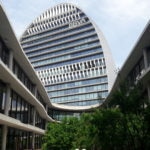What is BBVA doing to promote sustainable cities and communities?
According to the United Nations, today, more than half of the world's population lives in cities, a situation that will continue to escalate in the future. This has led to an increase in environmental pollution, inequality and poverty in these cities, a situation that testifies to the need to focus on advancing in UN Sustainable Development Goal (SDG) no. 11: To make cities and human settlements inclusive, safe, resilient and sustainable. In this task, BBVA also has a lot to say and to do.

Taking a more sustainable path is crucial to improving people’s living standards, because scarcity of resources such as water, lack of access to housing, a strained labor market and climate change are factors that affect people’s wellbeing. Hence, turning cities into more environmentally friendly and better places to live and to work, will increase economic growth and development levels.
BBVA is committed to environmental sustainability and ODS no. eleven. In this sense, it fosters the construction of sustainable infrastructures and recycling to contribute to curbing greenhouse gas emissions. In addition, it supports these initiatives by funneling resources to fund green projects and facilitate access to eco-homes.
BBVA: supporting sustainable buildings
As part of its Global Eco-efficiency Plan, BBVA has committed to building and renovating its corporate headquarters following strict sustainability standards. 17 of its corporate headquarters worldwide have earned LEED (Leadership in Energy & Environmental Design) gold and platinum marks, which distinguishes them as being sustainable, efficient and eco-friendly.
To receive this certification, BBVA builds its offices on sustainable plots, in the vicinity of adequate public commuting infrastructures; equipped with efficient water and power reduce consumption (from 12 to 48 percent), and use renewable materials, among other factors.
In the different countries where it operates, BBVA is carrying out different campaigns to encourage recycling among its employees and foster proper resource management in cities. In this regard, significant savings have been achieved, both in terms of water and energy, and the use of paper has been considerably reduced, thanks to the bank’s technological developments and digital transformation process.
Currently, 43% of BBVA employees work at certified buildings and about the same percentage at buildings with selective waste collection. The target for 2020 is to have 46 percent of the workforce working at certified buildings, increasing paper savings per occupant by 5 percent, as to expand selective waste collection strategy. In addition, as part of its ‘Pledge 2025', the bank is aiming to source 70 percent of its energy consumptions from renewables by 2025.

17 of its corporate headquarters worldwide have earned LEED (Leadership in Energy & Environmental Design) gold and platinum marks, which distinguishes them as being sustainable, efficient and eco-friendly.
Pledge 2025
In its determination to address climate change and promote sustainable development, and within the framework of its Pledge 2025, BBVA has committed to mobilize €100 billion to finance green projects, sustainable infrastructures, social entrepreneurship and financial inclusion.
In 2018, the Group funneled over €1.6 billion to fund sustainable infrastructure and agribusiness projects. In May of that year, the bank issued its first green bond, totaling €1 billion - the largest green bond at the time by a financial institution in Europe. These resources have been used to finance wind and solar energy projects that have generated 558 gigawatts/hour of renewable energy. In addition, the bank has also devoted some of these funds to fund sustainable transport projects. With this, BBVA contributed to reduce carbon emissions by 274,609 tons of CO2 over the course of that, and expects to avoid another 106,529 tons of carbon emissions in 2019.
In Latin America, BBVA was the first private bank to issue a green bond, specifically in Mexico, where it made two placements for a total value of MXN7 billion pesos. In addition, it has been the first entity to arrange a corporate green loan in South America, to the Ferreycorp company of Peru, for a total of $70 million.
BBVA is fully committed to mobilizing the necessary resources to offset negative impacts on the environment and last year issued a total of €7.89 billion euros in green bonds and granted €1.850 billion in green loans.
This year, in its aim to contribute to curbing CO2 emissions, BBVA has launched its Eco-Car Loan program, a €20 million green line of credit in Spain to help customers purchase of hybrid and electric vehicles. On top of this, it has also launched of a line of credit for the acquisition of 'green' homes, to promote the construction of highly-energy efficient buildings. Homebuyers that take out this loan, will benefit from a bonus on their mortgage’s spread.
In addition, the bank is promoting, together with Endesa, the construction of a wind farm in Zaragoza, that will add 34.64 megawatts to Spain’s renewable generation capacity. This wind farm will cover up to 30% of BBVA's energy needs in Spain, including corporate buildings and branch network. The remaining 70% will be covered by Endesa through the traditional supply model based on green certificates. All this will contribute to reduce the company’s carbon footprint. The Group has pledged to source 100% of its energy needs from renewables by 2030.
The Group estimates that by 2025 it will allocate €12 billion to the funding of education, health, social housing and sustainable transport infrastructures. In addition, with these resources, it will promote the issuance of intermediated social bonds as bookrunner (subscriber, arranger or coordinator of a securities issue), investment funds and participations, as well as financing of agribusiness under sustainability criteria.
BBVA and the SDGs
‘Pledge 2025’' is part of BBVA's efforts to contribute to the Sustainable Development Goals (SDG). Promoted by the United Nations, the 17 SDGs are a universal call-to-action to end poverty, preserve the planet and ensure that all people enjoy peace and prosperity.
These 17 goals address aim to new areas of concern, including as climate change, economic inequality, innovation, sustainable consumption and peace and justice. Thanks to its broad range of businesses – including the BBVA Microfinance Foundation - and its global footprint, BBVA Group contributes to all these goals